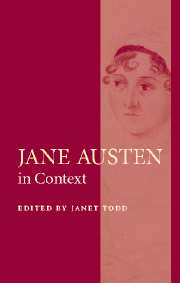10 - Critical Responses, 1830-1970
Published online by Cambridge University Press: 19 December 2020
Summary
Jane Austen's posthumous reputation depends to an extent on whether her readers belong to the nineteenth or to the twentieth century. On one side of this rough-and-ready divide, Austen is treated primarily as a particular kind of person; on the other, as a controlling sort of idea. By those in the earlier period (the Victorians especially), she is admired for her characters and comedy – the comedy, that is, of social manners. By those in the later, she is important, not because of the characters she creates, but because of the ethos or criticism she offers. The former approach tends to the institution of Janeites; the latter to a reaction against that type of enthusiasm. The first evolves out of the ‘Aunt Jane’ who was known to her contemporaries and more widely promoted, after her death, by the first major event of her posthumous life, the publication by her nephew James Edward Austen-Leigh of the Memoir of Jane Austen (1870). The second establishes a resistance to ‘Jane’, and demands that Austen be regarded, not as a social comedian, but as a morally significant author. For the Leavises – Q. D. and F. R. – Jane Austen is no longer the exquisite watercolourist of society, but beginning to have a critical purchase upon it. It is her ‘intense moral preoccupation’ – a ‘principle of organization’ in the work which derives from the ‘problems that life compels on her’ – that makes her ‘a great novelist’.
These changes in attitude seem to be marked by a turn from Life To Work, and from woman to writer. The life-story was tenacious, partly because it emerged only belatedly with the Memoir, partly because of a gendered response which linked the liking for Austen to her perceived lack of authorial identity. To notice a writerly aspect was comparatively rare even in 1885, when Leslie Stephen did so in his landmark entry for the Dictionary of National Biography. The shift in appreciation coincided with the advent of the modern novel – Woolf, Forster and James all comment – but a critical stance on Austen was acquired, it might be said, just as the criticism of English literature itself became an academic discipline.
- Type
- Chapter
- Information
- Jane Austen in Context , pp. 92 - 100Publisher: Cambridge University PressPrint publication year: 2005
- 1
- Cited by

